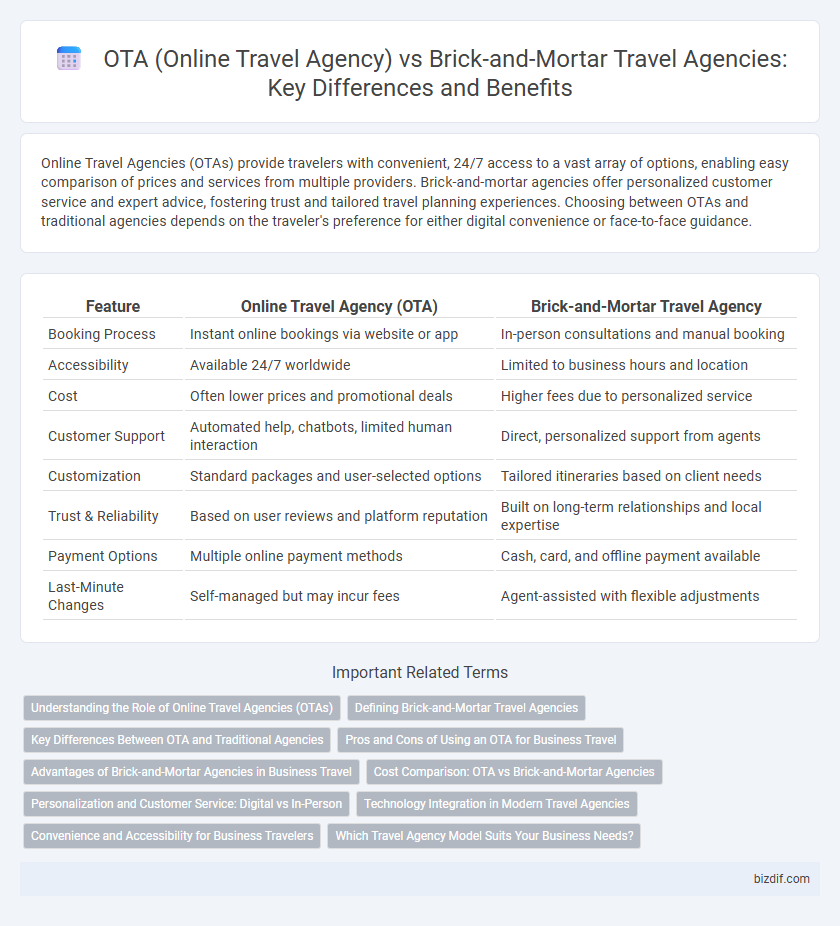Online Travel Agencies (OTAs) provide travelers with convenient, 24/7 access to a vast array of options, enabling easy comparison of prices and services from multiple providers. Brick-and-mortar agencies offer personalized customer service and expert advice, fostering trust and tailored travel planning experiences. Choosing between OTAs and traditional agencies depends on the traveler's preference for either digital convenience or face-to-face guidance.
Table of Comparison
| Feature | Online Travel Agency (OTA) | Brick-and-Mortar Travel Agency |
|---|---|---|
| Booking Process | Instant online bookings via website or app | In-person consultations and manual booking |
| Accessibility | Available 24/7 worldwide | Limited to business hours and location |
| Cost | Often lower prices and promotional deals | Higher fees due to personalized service |
| Customer Support | Automated help, chatbots, limited human interaction | Direct, personalized support from agents |
| Customization | Standard packages and user-selected options | Tailored itineraries based on client needs |
| Trust & Reliability | Based on user reviews and platform reputation | Built on long-term relationships and local expertise |
| Payment Options | Multiple online payment methods | Cash, card, and offline payment available |
| Last-Minute Changes | Self-managed but may incur fees | Agent-assisted with flexible adjustments |
Understanding the Role of Online Travel Agencies (OTAs)
Online Travel Agencies (OTAs) revolutionize travel booking by offering extensive inventories, real-time pricing, and user reviews, providing travelers with convenient, comprehensive options that traditional brick-and-mortar agencies often cannot match. OTAs leverage advanced algorithms and data analytics to personalize recommendations and optimize search results, enhancing the customer experience through mobile apps and websites available 24/7. Despite the rise of OTAs, brick-and-mortar agencies retain value in providing personalized service, expert advice, and support for complex itineraries or special requests.
Defining Brick-and-Mortar Travel Agencies
Brick-and-mortar travel agencies operate physical storefronts where customers receive personalized service and expert travel advice directly from agents, offering tailored vacation planning and support. These agencies provide face-to-face interaction, allowing for detailed consultations, instant problem resolution, and access to exclusive deals not always available online. Unlike OTAs, brick-and-mortar agencies prioritize building long-term client relationships through customized travel experiences and hands-on assistance.
Key Differences Between OTA and Traditional Agencies
Online Travel Agencies (OTAs) offer extensive digital platforms enabling travelers to compare prices, access reviews, and book instantly, enhancing convenience and often providing lower costs through dynamic pricing algorithms. Traditional brick-and-mortar agencies deliver personalized services with expert guidance, tailored itineraries, and in-person support, which can be crucial for complex travel arrangements and customer trust. OTAs excel in accessibility and real-time updates, while traditional agencies prioritize relationship-building and customized travel experiences.
Pros and Cons of Using an OTA for Business Travel
Online Travel Agencies (OTAs) offer businesses streamlined booking processes with 24/7 access to a wide range of flights, hotels, and car rentals, often at competitive prices due to dynamic pricing algorithms. However, OTAs may lack personalized customer service and flexibility needed for complex itinerary changes, which brick-and-mortar agencies provide through dedicated travel consultants and customized travel solutions. Relying solely on OTAs can result in limited support during travel disruptions, making hybrid approaches combining OTA convenience with agency expertise ideal for managing corporate travel efficiently.
Advantages of Brick-and-Mortar Agencies in Business Travel
Brick-and-mortar travel agencies excel in personalized service and tailored business travel solutions, leveraging face-to-face interactions to understand corporate client needs in depth. Their expertise in negotiating group rates, managing complex itineraries, and providing immediate support during travel disruptions adds significant value for business travelers. These agencies build long-term relationships with companies, offering dedicated account management and customized travel policies that online platforms often cannot match.
Cost Comparison: OTA vs Brick-and-Mortar Agencies
Online Travel Agencies (OTAs) typically offer lower costs due to reduced overhead expenses and the ability to aggregate multiple service providers, enabling competitive pricing and exclusive online deals. Brick-and-mortar agencies incur higher operating costs from physical storefronts and staff salaries, which often translates to higher service fees for customers. Despite higher prices, traditional agencies provide personalized service and expert consultation, which can justify the premium for some travelers.
Personalization and Customer Service: Digital vs In-Person
Online Travel Agencies (OTAs) offer extensive personalization through AI-driven recommendations and user data analysis, tailoring travel options to individual preferences efficiently. Brick-and-mortar agencies provide personalized customer service with face-to-face interactions, enabling immediate problem-solving and detailed, customized advice based on personal rapport. While OTAs excel in convenience and broad choices, traditional agencies deliver a hands-on experience that enhances trust and complex trip planning.
Technology Integration in Modern Travel Agencies
Modern travel agencies leverage advanced technology integration to enhance customer experience, with OTAs offering seamless online booking platforms, real-time inventory updates, and AI-powered personalized recommendations. Brick-and-mortar agencies integrate CRM systems and virtual reality tools to provide personalized, in-person consultations combined with digital convenience. Efficient technology adoption in both models drives operational efficiency and tailored travel solutions, distinguishing them in competitive markets.
Convenience and Accessibility for Business Travelers
Online Travel Agencies (OTAs) offer unmatched convenience and 24/7 accessibility, allowing business travelers to book flights, hotels, and rental cars anytime from any device, streamlining last-minute changes and itinerary management. Brick-and-mortar agencies provide personalized service and face-to-face support, which can be crucial for complex or customized business travel needs, especially in regions with limited internet accessibility. For time-sensitive corporate travelers prioritizing speed and flexibility, OTAs often deliver a more efficient booking experience, while physical agencies excel in offering tailored solutions and human assistance.
Which Travel Agency Model Suits Your Business Needs?
Choosing between an OTA (Online Travel Agency) and a brick-and-mortar agency depends on your target market, budget, and service preferences. OTAs offer extensive reach, 24/7 accessibility, and lower operational costs ideal for tech-savvy customers seeking convenience and competitive pricing. Brick-and-mortar agencies provide personalized service, expert local knowledge, and trust-building face-to-face interactions suited for travelers valuing tailored experiences and direct support.
OTA (Online Travel Agency) vs Brick-and-mortar agency Infographic

 bizdif.com
bizdif.com